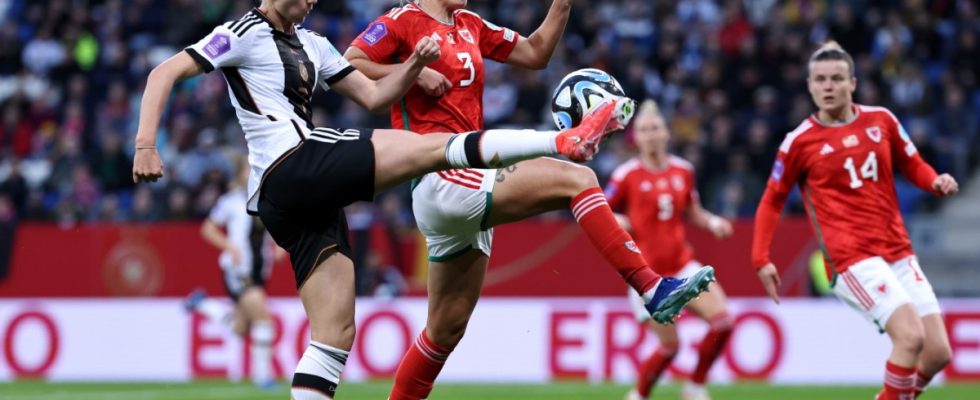This chance was almost, but only almost, wasted. The ball hit the aluminum. And in anxious milliseconds, the German national team followed the trajectory of the game equipment, which was more like the impact of a meteorite: the ball thundered down from the crossbar – just behind the goal line and from there with spin into the net. With this penalty from Giulia Gwinn to make it 3-1, the German national team’s second spring in the Nations League group game against Wales began, so to speak, in the 80th minute.
Six minutes later, Sjoeke Nüsken increased the score to 4:1 with a deflected shot, and two minutes later Nicole Anyomi made it 5:1. And even if the Germans could still be annoyed about missed opportunities afterwards, they still managed to get a new start under interim national coach Horst Hrubesch in front of 20,107 spectators in Sinsheim. In his ninth international match as women’s national coach, it was the eighth victory in a draw – and a particularly important one in the fight for Olympic qualification.
The relaxedness that the players had described since Horst Hrubesch took over the team was also evident on the pitch. The game seemed livelier, more fluid, the build-up was more dynamic and with more momentum towards the goal. Hrubesch spent most of the time watching the whole thing from as close as he could. The 72-year-old stood in the right corner of the coaching zone, his arms crossed or his hands in his pockets. At first he watched everything closely without saying much. He had already suspected the day before that he might be tense: “I didn’t think the whole thing could be so exciting again.”
And even if the old habit sometimes crept in of preferring to give the ball away again, Hrubesch was probably happy with the selection: four good chances in the first quarter of an hour. But no goal. And so the amount of speaking he did increased steadily until he took advantage of two breaks in the Welsh women’s treatment to talk intensively with Lea Schüller. His words had an effect: Sarai Linder ran unstoppably down the left side, sent a cross into the penalty area – and Schüller was in exactly the right place to make it 1-0 with his head. Hrubesch raised his arms: Go ahead!
He could have been happy even more often if his players hadn’t been careless with the opportunities. Laura Freigang – on the pitch for the ailing captain Alexandra Popp – received a wonderful, long pass from Lena Oberdorf, ran towards the goal alone and hit the Welsh goalkeeper Olivia Clark with her shot. Even inexperienced lip readers could decipher what Hrubesch now said: More courage!
What he then shouted into the Sinsheim sky was perhaps not suitable for young people, because immediately afterwards the guests used their first shot on goal to equalize in the 42nd minute. The Germans defended far too passively and basically presented their football teacher with a possible topic for the next training session. Ceri Holland almost effortlessly brought the ball past Ann-Katrin Berger, who was replacing regular Merle Frohms (concussion).
At halftime, Sara Däbritz and Laura Freigang left the pitch for Sjoeke Nüsken and Linda Dallmann – and the latter hardly let any time pass. In the pattern of the first goal, she ran down the right side, crossed towards the goal and found Schüller, who increased the score to 2-1 in the 47th minute. The Germans created opportunities again and again, which was their clear mission. They still have to displace Denmark as group winners in order to keep their chance at the 2024 Olympics.

